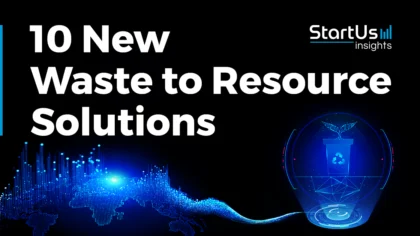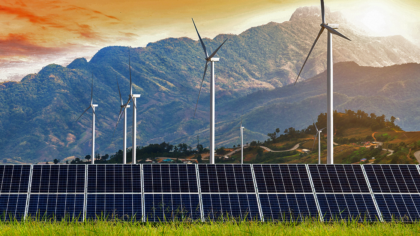New waste to resource solutions are gaining momentum as pivotal tools for tackling environmental degradation. Waste management is shifting towards resource recovery. From organic waste valorization to plastic recycling, the spectrum of waste-to-resource encompasses diverse sectors to mitigate ecological footprints. 10 new waste to resource companies are emerging as frontrunners in this journey towards sustainability. Among these, biorefineries leveraging advanced enzymatic processes to convert biomass into valuable bio-based products are getting the most attention.
Similarly, novel techniques in chemical recycling are advancing plastic waste management by breaking down polymers into their constituent monomers for reuse. Additionally, the utilization of AI algorithms is streamlining waste sorting and recycling operations, enhancing efficiency and accuracy. Moreover, the new companies are also offering closed-loop systems, where waste is repurposed as inputs for new production cycles. As these technologies continue to mature, they keep on advancing waste management, supporting a more sustainable and resource-efficient future.
Continue reading to gain up-to-date and data-driven insights on:
- Profiles of 10 Emerging Waste to Resource Solutions
- How to Scout the Best Waste to Resource Solutions Easily
Key Takeaways
Drawing insights from the Big Data & AI-powered StartUs Insights Discovery Platform that provides data on over 4.7+ million emerging companies globally, we explore the evolving landscape of the waste to resource industry. This sector is marked by key trends and a substantial workforce, shaping its future. Our latest update of this report was 5 days ago. If you found a mistake or missing information, tell us! Here are some key insights at a glance:
- Current Waste to Resource Trends: Some of the major trends impacting waste to resource are waste to energy, organic waste upcycling, bio-based crude oil, clean biochar production, and organic fertilizers & animal feeds.
- Waste to Resource Industry Statistics: The sector comprises 16.7K+ organizations worldwide. Out of these, 2.6K+ new waste to resource solutions were found in the last five years. On average, each of these organizations employs about 17 people and witnesses 2020 as the average founding year. Moreover, the average funding received by these 2.6K+ companies per round in the same span is USD 11 million.
- 10 Top Waste to Resource Solutions to Watch:
- Cyclion – Plastic & Biomass Waste to Oil
- Seramic – Industrial Solid Waste to Ceramics
- Pressure Corp – Clean Power from Waste Pressure
- Cemonite – Concrete from Mining Waste
- Yngvik – Compostable Plastic from Food waste
- Veleco – Organic Waste to Biogas
- WasteX – Pyrolysis-based Biochar Production
- Zewa – Food Waste to Organic Fertilizer
- TerraWaste – Wet Biomass to Bio Crude Oil
- Kly – Functional Flour from Wasted Bran
Meet 10 out of 2.6K+ New Waste to Resource Solutions
This section provides a hand-picked list of 10 new waste to resource solutions that are advancing various sectors with their advanced technologies, including waste to energy conversion systems, the transformation of food waste into organic fertilizers and biogas, upcycling of mining waste, and the utilization of clean power generation from waste pressure.
Through their innovative solutions, these companies are promoting sustainability and circularity in waste management practices. By spotlighting their diverse applications, this article illuminates the expanding landscape of waste to resource solutions and underscores the pivotal role these companies play in shaping a more sustainable future.
Note on Signal Strength
One of the unique metrics we feature for each company is Signal Strength, a proprietary data point generated by our Discovery Platform. It gauges the extent to which a company’s influence has permeated the global ecosystem of startups, scaleups, and emerging companies. This proprietary metric serves as a valuable guidepost for understanding a company’s standing in the broader market landscape.
1. Cyclion
- Founding Year: 2022
- Employee Range: 2-10
- Location: Australia
- Signal Strength: Medium Strong
- What they do: Cyclion converts waste into resources through liquefaction. Its technology, Cyclion Catalytic Fluid (CCF), breaks down a mixture of plastics and biomass like food scraps and paper at low temperatures and pressure. This eliminates the need for extensive pre-sorting of waste, unlike traditional methods. Cyclion’s system accepts unsorted municipal solid waste and utilizes a special catalyst to liquefy it into usable oil. This oil can then be further refined into fuel or converted into electricity. The low operating temperature minimizes harmful emissions and the CCF catalysts ensure the system is environmentally safe. Furthermore, algae tanks purify water and exhaust gases while converting CO2 to oxygen, creating a sustainable closed-loop system.
2. Seramic
- Founding Year: 2019
- Employee Range: 2-10
- Location: UAE
- Signal Strength: Very Strong
- What they do: Seramic upcycles industrial byproducts like steel slag and foundry sand into high-performance ceramic products, Seramic Materials. Its system accepts recycled waste materials and converts them using a multi-step process. First, the waste undergoes crushing and sieving to achieve a uniform consistency. Then, it mixes the precisely sized particles to create a new ceramic composite material. This formulated mixture is then used to manufacture floor and wall tiles, along with high-temperature thermal energy storage materials. This eco-friendly approach eliminates reliance on virgin resource extraction and reduces CO2 emissions compared to conventional ceramic production.
3. Pressure Corp
- Founding Year: 2020
- Employee Range: 2-10
- Location: USA
- Signal Strength: Very Strong
- What they do: Pressure Corp captures wasted pressure from natural gas pipelines and converts it into clean electricity through its waste pressure power system. This system targets pipeline letdown stations, where pressure needs to be reduced before the gas reaches its final destination. Pressure Corp’s technology captures this excess pressure via a multi-component system. First, a pre-heater increases the gas temperature, enhancing efficiency. Then, a turboexpander, the core component, converts the pressure into kinetic energy. A gearbox assembly adjusts this kinetic energy for optimal electricity generation, and finally, a generator converts it into usable electricity.
4. Cemonite
- Founding Year: 2019
- Employee Range: 11-50
- Location: Norway
- Signal Strength: Medium Strong
- What they do: Cemonite uses recycled mine tailings to make sustainable concrete. Its production process replaces Portland cement, a major contributor to CO2 emissions, with a blend of activators, aggregates, and specially treated mine tailings. This eliminates reliance on energy-intensive cement production and transforms waste into a valuable building material. Cemonite is currently constructing a pilot factory to assess large-scale production and explore potential applications for this eco-friendly concrete alternative.
5. Yngvik
- Founding Year: 2022
- Employee Range: 2-10
- Location: Denmark
- Signal Strength: Weak
- What they do: Yngvik tackles plastic pollution and unsustainable bioplastic practices with their compostable bioplastic derived from food waste. Their two-step process starts by collecting food scraps from farms, supermarkets, and even university cafeterias. Next, they utilize a technique called precision fermentation to transform this waste into a new type of plastic polymer named CAL. This innovative bioplastic offers versatility, forming into thin films and adhesives. Both configurations degrade naturally in water and show promising signs of being home compostable in addition to industrial facilities. Yngvik’s solution caters to plastic converters grappling with rising plastic waste regulations and combats environmental challenges like plastic pollution and the land use required for conventional bioplastic production.
6. Veleco
- Founding Year: 2020
- Employee Range: 2-10
- Location: Spain
- Signal Strength: Weak
- What they do: Veleco’s waste management plants convert organic waste into resources by breaking down organic materials like manure, farm waste, or sewage sludge in an oxygen-free (anaerobic) environment. This process yields biogas+, a refined fuel that has a higher calorific value compared to conventional biogas, making it comparable to natural gas in energy output. Veleco offers three biogas+ plant sizes to suit various waste capacities. The modular design ensures easy assembly without heavy machinery, while the surface-mounted construction eliminates excavation needs. Additionally, it provides Biogas+ Care, a maintenance service to ensure optimal plant operation. Apart from biogas production, the process also generates high-quality fertilizer as a byproduct.
7. WasteX
- Founding Year: 2022
- Employee Range: 2-10
- Location: Singapore
- Signal Strength: Very Strong
- What they do: WasteX tackles agricultural waste by transforming it to biochar, through its end-to-end biochar solution. It offers a proprietary, small-scale, modular carbonizer that utilizes a thermochemical conversion process, pyrolysis to convert various biomass waste materials like corn cobs or manure into high-quality biochar. The pyrolysis occurs within the carbonizer in an oxygen-limited environment, maximizing biochar yield. Furthermore, the solution emphasizes automation, minimizing daily manual operation requirements. This solution enables agricultural producers in to generate additional income streams by converting waste into biochar usable for soil amendment and sold commercially. WasteX’s biochar production process also generates carbon credits, adding another revenue stream for clients.
8. Zewa
- Founding Year: 2020
- Employee Range: 11-50
- Location: India
- Signal Strength: Medium
- What they do: Zewa tackles food waste at home with its Zewapod, a bioconversion unit. It utilizes Black Soldier Fly (BSF) larvae, a natural decomposer, to convert food scraps, vegetables, and even meat waste into valuable resources. Inside the unit, BSF larvae feed on the organic waste, multiplying rapidly and converting the waste into protein-rich insect biomass. This insect biomass can then be dried and used as animal feed for poultry and fish. A byproduct of the process is insect frass, which is a potent organic fertilizer rich in nutrients, and suitable for promoting plant growth in household gardens. Zewa thus offers a sustainable solution for households seeking to reduce waste and create valuable resources from organic kitchen scraps.
9. TerraWaste
- Founding Year: 2021
- Employee Range: 2-10
- Location: Netherlands
- Signal Strength: Very Strong
- What they do: TerraWaste tackles non-recyclable waste with its htloop technology, a hydrothermal liquefaction (HTL) process that converts organic and inorganic waste materials into resources. Within a closed, pressurized system, htloop utilizes high temperatures to break down complex molecules in the waste feedstock. This thermochemical process, including chain scission, hydrolysis, and decarboxylation, ultimately converts the waste into a bio-crude oil. Similarly, processing tree bark and wood chips through htloop results in biochar and oils. Apart from plastics, htloop also accepts organic waste, food scraps, and even sewage sludge. Its closed loop design confines reactions and reduces gas and residue production. Additionally, htloop enables resource efficiency by reusing heat and water within the system. This innovative technology demonstrates the ability to convert a wide range of difficult-to-recycle plastics into high-quality synthetic oils.
10. Kly
- Founding Year: 2021
- Employee Range: 2-10
- Location: Switzerland
- Signal Strength: Very Strong
- What they do: KLY formulates SustainGrain, a plant-based ingredient by upcycling bran, a side-stream of grain production. This process starts with partnering with local millers to source wheat bran, which they then refine through advanced milling techniques to increase the surface area, enhancing its functional properties. Following milling, the bran undergoes a specialized fermentation process using proprietary starter cultures that boost its nutritional and functional characteristics, making it suitable for a wide range of culinary applications. SustainGrain integrates into various recipes, from baked goods to sauces, without impacting the final product’s taste, color, or texture. This ingredient is rich in fiber, protein, minerals, and prebiotics, supporting digestive health and enabling clean-label products. Thus, by converting wasted bran into SustainGrain, KLY helps reduce food waste and promotes a more sustainable food production cycle, benefiting food manufacturers and eco-conscious consumers.
Quick Tip to Find New Waste to Resource Solutions
Utilizing a SaaS platform like the Discovery Platform for identifying new waste to resource solutions provides significant benefits compared to traditional scouting methods:
- Increased Efficiency: The Discovery Platform offers advanced tools that streamline the scouting process. It replaces your hours of conventional desk research, saving time and resources in identifying waste to resource innovations.
- Access to Real-time Insights: Gain a competitive edge with up-to-date information on the latest trends in the waste to resource industry. The platform keeps you informed with near real-time updates on emerging waste to resource solutions and news, enabling you to make swift and informed decisions.
- Precise Scouting: Customize your search to focus on specific niches within the waste to resource sector, such as waste to energy, organic waste upcycling, or circular materials production. The platform’s diverse filtering options allow you to target your scouting efforts precisely, ensuring that you find the most relevant and groundbreaking companies in the field.
Explore All New Waste to Resource Solutions!
We’ve explored the dynamic landscape of the waste to resource industry, examining the latest trends and spotlighting exceptional companies driving innovation. To dive deeper, download our free Circular Economy Report or schedule a demo of the Discovery Platform for a customized exploration of these groundbreaking developments. Interested in enhancing our coverage of startups and tech? We value insights from experts like you – reach out!










